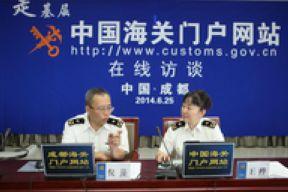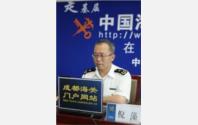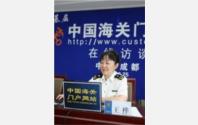 Online Interview
Online Interview
Topic: “QuanYuTong” Brings Steady Growth to Sichuan’s Foreign Trade
Time:10:00 AM (Wed) June 25, 2014
Special Guests:Ni Zao, Deputy Director General and Party Leadership Group Member of Chengdu Customs District
“QuanYuTong” Brings Steady Growth to Sichuan’s Foreign Trade
[Ni Zao]: The first stage was centered around Shuangliu Airport. Internally, its management was linked with Chengdu High Tech Comprehensive Bonded Zone. When enterprises are declaring between the airport and bonded zone, information is shared, the process is linked. There is no need for them to have to apply at both ends. Externally, we worked with inspection and quarantine departments to create a data sharing network which covers the airport's supervision command system. At present, this part of the undertaking is more or less complete. 06/25/2014 10:29:27
[Ni Zao]: The second stage is to develop the project to include ports on railways, roads, and waterways, promoting integrated customs clearance to other areas of the provinces. This way, enterprises can select where they wish to declare, thus achieving the "Integration of Free Trade Zones and Ports" and "Multiple Declaration Points, Multiple Release Points". At the same time, we plan to start constructing a supervision command system covering the entire customs district as well as an enterprise customs logistics services system. This stage is expected to be completed by the end of the year. 06/25/2014 10:29:40
[Ni Zao]: The third stage will be to promote the system in customs districts outside of Chengdu. This will include achieving integrated customs clearance with other areas in the Yangtze River Delta like Chongqing and Shanghai. 06/25/2014 10:29:48
[Wang Hua]: I can tell that the three major systems that are part of the "QuanYuTong" are very important. Can you explain to us briefly their roles? 06/25/2014 10:30:15
[Ni Zao]: Certainly. The three systems are the Chengdu Regional Customs Logistics Supervision System, the Centralized Supervision Command System, and the Enterprise Customs Logistics Services System. Each system is quite complicated, but simply put, the Regional Customs Logistics Supervision System is for use by both enterprises and Customs. The Centralized Supervision Command System is used by Customs to manage and supervise. The Enterprise Customs Logistics Services System is for enterprises to search for available services.

[Wang Hua]: When a shipment is imported for example, which functions of these three systems will be used? 06/25/2014 10:31:13
[Ni Zao]: If an enterprise in Chengdu High Tech Comprehensive Bonded Zone imports a consignment of goods, they will first use the Regional Customs Logistics Supervision System to conduct logistics supervision and enter and transfer information through the "Integration of Free Trade Zone and Port" model. After that, our Command System will monitor the entire transportation and customs clearance process of this consignment. Finally, the enterprise can use the Logistics Services System to check on the status of their goods. 06/25/2014 10:31:33
[Wang Hua]: So enterprises can enter and transfer logistics information in the Logistics Supervision System and then check up on their declaration on the Logistics Services System? 06/25/2014 10:32:06
[Ni Zao]: Correct. Enterprises can not only check on the status of their goods, but information on the whole process including when it arrives at port, the goods tally, and loading and unloading. The manifest inquiry system Chengdu Customs District developed, allows enterprises to check on the manifest status. 06/25/2014 10:32:24
Quick Links







